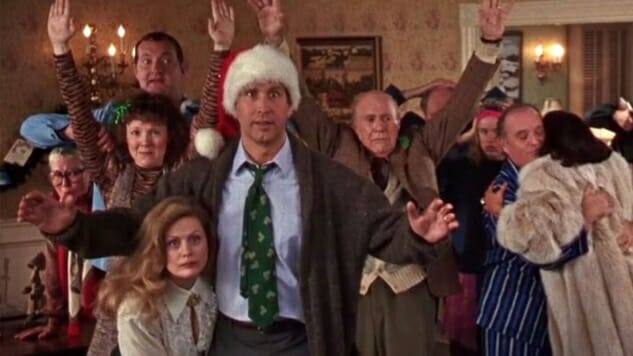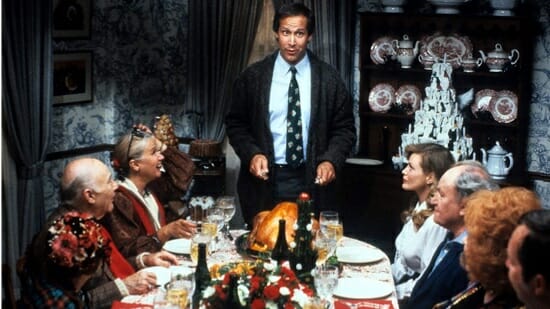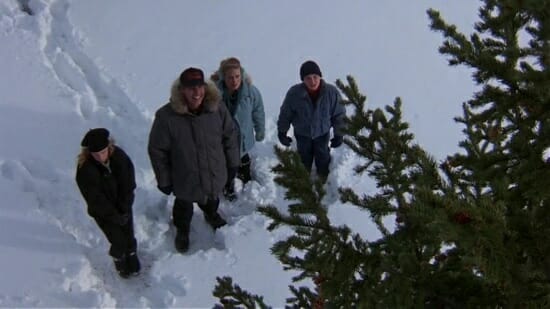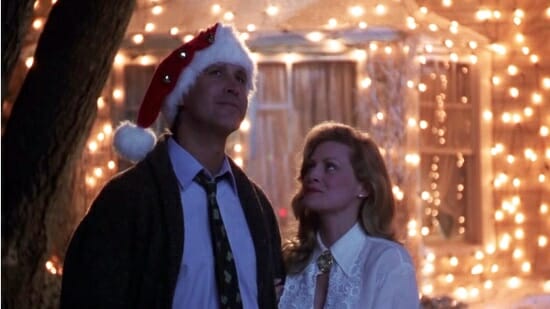Christmas Vacation is 35! Where’s the Tylenol?
The sendup of boomer holiday largesse is still hilarious, and even more cutting.

Every year, American culture embarks on a massive project to carefully recreate the Christmases of Baby Boomers’ childhoods. —Randall Munroe
White suburban dads in the movies of the ’80s and ’90s looked exactly the same as my own father—a man who, when I was two, wired up a cardboard box with batteries and lights so that I could be a Transformer for Halloween, lighting it all up by pushing a button. It’s one of the reasons why paterfamilias Clark Griswold’s epic battle with his exterior lighting setup in National Lampoon’s Christmas Vacation (1989) feels like only the slightest surrealist exaggeration of actual holiday hell.
The third movie in the Griswold clan’s story trades out the road trip structure but keeps the episodic nature, drawing in new characters exactly before they’re needed for the scenario and then weaving in setups whose payoffs you’ll guess the moment you see them. It doesn’t matter: 35 years on from its debut, my girlfriend’s kids howled with laughter at every punch line and pratfall.

Ellen: “I know how you build things up in your mind. You set standards that no family can ever live up to.”
Clark: “When have I ever done that?”
Ellen: “Parties, weddings, anniversaries, funerals, holidays, vacations, graduations…”
The movie catches up with the Griswold family in their natural habitat in Chicago, preparing for what Clark (Chevy Chase) is determined will be a big family Christmas. At the same time, he’s waiting for a big fat Christmas bonus check that basically nobody gets anymore—not because he’s struggling to keep the heat on or that the kids need insulin, but so that he can install the in-ground pool he wants.
The rest of the family, Ellen (Beverly D’Angelo), Audrey (Juliette Lewis) and Rusty (Johnny Galecki), are relegated to background characters in this installment, with barely any of their own gags and not a single subplot. Even more than in the road trip movies, they’re just trying to survive their father’s self-centeredness and avoid their squabbling family members from out of town. Galecki plays off Chase the best though, as a son who is so disillusioned with his father’s uniformly, predictably bad behavior that it’s become resignation. At one point, Clark encounters a hot female department store clerk and immediately loses the power of coherent speech, and Rusty can spot what’s going on at a distance with perfect clarity.
John Hughes’ script hits every exhausting holiday obligation, from picking out the far-too-big tree, to hosting ungrateful and weird family members, to the elaborate outdoor lights, to senile relatives who bicker and give lame gifts, to the inevitably ruined turkey. Hughes would return to the suburban Christmas the very next year in Home Alone, another comedy pitched straight to the cheap seats that manages to dig deep into some of the uncomfortably familiar things about my own Christmases growing up.

Dad brought the tree into the garage and attached the stand. He was in a much better mood. He always is after he does something really stupid. —John Hughes, “Christmas ’59”
I wrote that Die Hard is a movie about dealing with assholes during the holidays. So is Christmas Vacation, with the crucial difference that the asshole in question is our own boomer parents. Hughes has made no secret of the fact he didn’t particularly want to revisit the characters from National Lampoon’s Vacation: In an interview in 2000, he said his writing credit on European Vacation was due to his having created the characters, and he only returned to write Christmas Vacation because he could easily base it off an exasperatingly racist short story he wrote for the National Lampoon magazine, published in December 1980, titled “Christmas ’59.”
